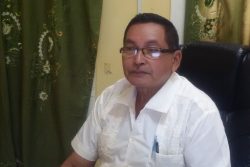Dear Editor,
Several rational persons advise that there is little wisdom in responding to public statements made by Mr Frederick Kissoon, and they would never be drawn regardless of what he writes. The same advice has come from legal minds even when they acknowledge that libel was committed. Indeed, it has been a policy of the University of Guyana administration to ignore him, and except for a few cases when I thought the university needed to be protected, I have accepted the advice.
However, that has allowed Mr Kissoon to get clean away with multitudinous unchallenged falsehoods, distortions, deceptions and a good deal of mischief. This line of untruths continued in a letter ‘Why is the government so enamoured of Dr Rose?’ (SN, 26.9.07). Although there is a great mountain of those perfidies to be addressed, I will only refer to a few of the claims in this letter, which follow other recent pronouncements from Mr Jason Benjamin whose name is often attached to Mr Kissoon’s letters.
Those, Mr Editor, including yourself, who go to print on the strength of Kissoon and Benjamin’s information ought to be aware that they do not have a reputation for accuracy, and ought to be wary.
First of all it is not true that the President re-appointed Dr Rose on three consecutive occasions, or on any occasion. He has not been re-appointed three times, and it is the University Council that has made appointments. In 2005 the life of the Council expired and was renewed on a number of occasions. Some members remained for a while uncertain of their status as members and stayed away. During this time, at a meeting attended by only 8 members, a decision was taken regarding the vice-chancellorship. Although the quorum is 8, who with a serious care for the university would be satisfied with a decision taken on such an important issue by a close split vote of 4 – 3 out of only 8 members of a 25 member Council? At a subsequent meeting with a healthy attendance that decision was overturned.
Secondly, Kissoon reports that when the subject was discussed at a meeting of the Academic Board “only two lecturers favoured contract renewal but with evaluation.” That is false. Unlike Messers Kissoon and Benjamin, it is not my habit to make public privileged information from confidential meetings. But I am forced to disclose that according to the official minutes of the meeting of June 13, 2005, the matter ended in a strong consensus with no recorded dissenters, in favour of support for Dr Rose. Although it was proposed that there should be provision for evaluation of performance, the position which carried was that Dr Rose should be given a full contract and the support of the Council. It called for better relations between Council and administration and for the Vice-Chancellor to be left alone to exercise his powers for effective performance. The same position was taken at the Committee of Deans, except that nothing was said there about evaluation.
In 2007 the “search committee” closed applications for the post of Vice-Chancellor on April 30. The names of some persons it is claimed have applied for the post have been revealed in the press, betraying the trust and confidence of the applicants. There are two questions. If, as they say, there was a flood of high-powered, well-appointed applicants, why did the Council keep extending and re-extending the closing date? Secondly, if you close applications on April 30, 2007, you cannot expect to have someone in office by October 1, 2007, given the length of time these processes normally require. Any high-powered high flyer would already have been well established somewhere, and only someone who was unemployed or sitting around awaiting this appointment would have been ready to take up an offer within a month or two. Mr Kissoon is fond of using UWI as a shining example, but it took UWI nearly two years to do what he expects UG to do in two months.
It is useful to note, also, that the UWI Vice-Chancellor gets a 6-year contract. At the University of Guyana, a Vice-Chancellor is stifled with one lasting two years, which challenges an officer’s empowerment and the breadth for effective confident stewardship. The UWI Council, unlike UG’s, allows the VC the freedom to be the chief executive, the administrative and academic head that he is, without taking over matters of management.
Messers Benjamin and Kissoon argue that the Vice-Chancellor is re-appointed without public advertisement and without evaluation, but UG, like universities generally, has never had any formal statutory system of evaluation for any of its top officers. The two gentlemen, however, are totally satisfied that the contracts of other officers at UG, like the Registrar and Bursar, have been repeatedly renewed without advertisement, without discussion and without evaluation. They are happy that the Pro-Chancellor’s tour of office came to an end in 2006, but has had repeated extensions since then. Kissoon and Benjamin protest loudly that Dr Rose is affiliated to the PPP and should, therefore, not hold the vice-chancellorship, but it never bothered them that the Pro-Chancellor is a known public advocate for the party.
Mr Kissoon, however, has no quarrel with the Pro-Chancellor, the Bursar or the Registrar; Dr Rose is his b








